



Matters
Now






Chair and President’s Message
Needless to say, these last two years have been extraordinary, and the questions they’ve raised, profound. As an organization that has always sought to work in support of positive social and environmental change, this has been a period of reflection and challenge.
This time of extreme disruption — the confluence of a global pandemic, the climate and biodiversity crises, the erosion of trust and respect for institutions, and urgent calls for a fundamental reordering of our society — has led many of us to ask, what matters now?
For Metcalf, this question requires us to look both inward and outward. We must begin by looking at ourselves because philanthropy isn’t simply a matter of making grants. We have a responsibility to the public, rooted in the deep privileges of accumulated capital. Foundations enjoy exceptional license when it comes to deciding what to support, how to distribute money, and how (and even whether) to account for decisions.
We have always tried to be conscious of the implications of our choices and have sought to mitigate the power imbalances inherent in philanthropy. We have invited members of the communities we seek to serve and support into our decision-making processes, and much of our work has been focused on helping organizations and communities thrive by enabling them to determine their own priorities and outcomes.
Nevertheless, we can do better. We are examining our internal culture to ensure we are transparent, accountable, and inclusive. We are thinking about the power that we hold, and how we can better share and distribute that power among and within the communities we support — extending to how we invest our financial assets.
Our inward examination and reflection on what matters now has implications for the outward facing part of our work — the choices we make about the issues we prioritize, the gaps we address, and the values we reinforce. Addressing systemic inequities and taking meaningful action on reconciliation needs to be at the top of the list.
In our Environment program, we have been strengthening our commitment to Indigenous-led conservation and nature-based climate solutions. Working with partners, we are reimagining how conservation is approached in Canada, grounding our work in respect for Indigenous rights, culture, and tradition.
The pandemic cast a harsh spotlight on low wages, poor working conditions, and the importance of paid sick days — particularly in sectors deemed essential. Public attention finally converged on many of the issues we have long worked to advance within our Inclusive Local Economies program. We are seizing the momentum this crisis has created to push for policies that can lead to decent work for all.
The last two years have been harrowing for arts workers. While we have seen amazing resilience and perseverance from individuals and organizations, we know many are still reeling. As we grapple with how best to continue supporting individual leadership and organizational innovation through our Performing Arts program, we are also pursuing new thinking about the role and capacity of the arts sector in a post-pandemic world.
The pandemic has underscored the importance of being agile, flexible, and responsive in our philanthropic practice. As part of our COVID-19 response we provided $3 million in funding to 82 organizations, nearly all of which was unrestricted, to help organizations and the sector as a whole weather the storm and emerge stronger together.
This pandemic has been devastating — its impacts have been severe, unequal, and often unjust. But it has given all of us an opportunity to reimagine the society that we want — a chance to really examine what matters now — and to put all of our efforts towards making that happen.
As always, and especially in this time, we are deeply grateful to our board, advisors, fellows, friends, and remarkable staff for all their thoughtful and creative contributions to our work.


Share the Chair and President’s Message:





Now?




Investing in people, ideas, and actions to build a just, healthy, and creative society.

“If, in a world where the needs are vast and immediate, we are to be funders who are in it for the long haul, who have chosen to husband our resources and allocate them over an indefinite time frame, then where and how we direct our small amounts of money now is crucial. Our grants must seek impact, to be both brave and wise. We should be the rare money — the support that is not otherwise available — that opens a door, draws a connection, conjures an opportunity, or creates a pause.”
OUR FUNDING PHILOSOPHY
1. Have the courage to tackle tough issues.
2. Be supportive, not prescriptive.
3. Embrace diverse perspectives.
4. Be curious, respectful, and rigorous.
5. Share knowledge and learn collectively.
ENVIRONMENT

INCLUSIVE LOCAL ECONOMIES

PERFORMING ARTS

2020-2021
Charitable Spending
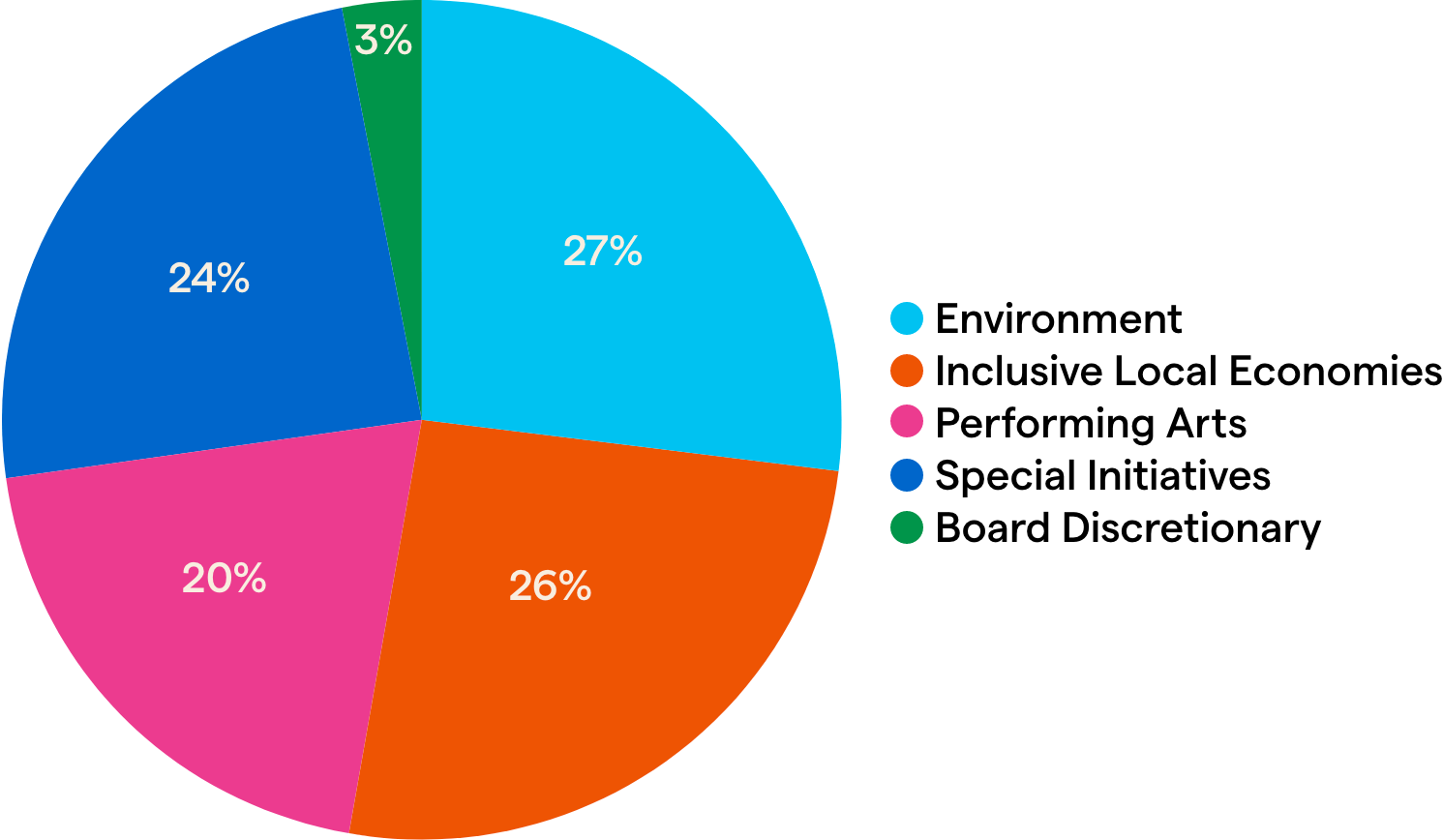
Total Assets (2021)
Impact Investments (2021)
Established
in 1960
Innovation Fellows
Share the Metcalf Snapshot:

Now?





Environment
So, what matters now?
With the twin crises of biodiversity loss and climate change, time is not on our side. Now, more than ever, we must search out those sweet spots where collective action can benefit many and accelerate progress like never before. For us, that involves working at the intersection of climate, biodiversity, and sustainable livelihoods. Here, we have an opportunity to reimagine conservation in Canada to ensure it is grounded in respect for Indigenous Peoples, worldviews, rights, culture, and livelihoods.
A month before the pandemic crashed ashore, we were in Ottawa with over 400 leaders from across the country for the Nature-Based Climate Solutions Summit. The gathering was the culmination of work that Metcalf’s Environment program had been seeding over the previous few years as part of our effort to tackle climate change and biodiversity loss with integrated solutions.
For most of us, that was the last time we were all together in such a way. Soon after, our personal and professional lives were upended by the pandemic. The months that followed, and this biennial period, were marked by unique stories of challenge, tenacity, and achievement by our grantees and partners.
A bright spot from a tough two years was the growing recognition of and support for Indigenous-led conservation in Canada.
Conservation has a decidedly mixed history in Canada. At its worst, settler practices and approaches to conservation have led to the forced relocation of Indigenous communities, and the destruction and destabilization of livelihoods and cultures.
Through our work with the Conservation through Reconciliation Partnership, Metcalf has joined with partners to reimagine conservation in Canada with a shared goal of supporting Indigenous-led conservation. Many philanthropic foundations, including Metcalf, have historically provided very little funding for Indigenous-led conservation. Through our Environment program, we have committed to prioritize funding for Indigenous-led conservation. Almost half of our grants budget now supports Indigenous-led or partnered work. Going forward we expect this figure will grow as we deepen our support for Indigenous Nations who are working to plan and establish Indigenous Protected and Conserved Areas (IPCAs).
Strengthening government support for nature-based climate solutions has been a core goal of our work in recent years. Despite the challenges of the past two years, we were heartened to see progress in this area. Alongside partners and colleagues, we celebrated the federal government’s commitment to protect 30% of lands and waters by 2030, increased support for Indigenous-led conservation and Indigenous Guardians, and billions of new funding for nature-based climate solutions. To help guide new investment in these spaces from government, philanthropy, and wider society, we have supported cutting-edge research, cross-sector convening, and community knowledge gathering to build a solid foundation of information and insights.
Thinking back to that early February 2020 gathering in Ottawa, and the energy and optimism in the room, few could have anticipated the pandemic upheaval that would soon follow. We also could not have predicted our collective response. Through an incredibly tumultuous period, we witnessed an array of Metcalf’s grantees and partners dig deep, rally together, and pull the energy and enthusiasm forward from the Ottawa gathering, despite the myriad challenges unfolding around us. Over the ensuing months, landmark research would be released, momentous political commitments secured, and historic government investments won in support of Indigenous-led conservation and nature-based climate solutions.
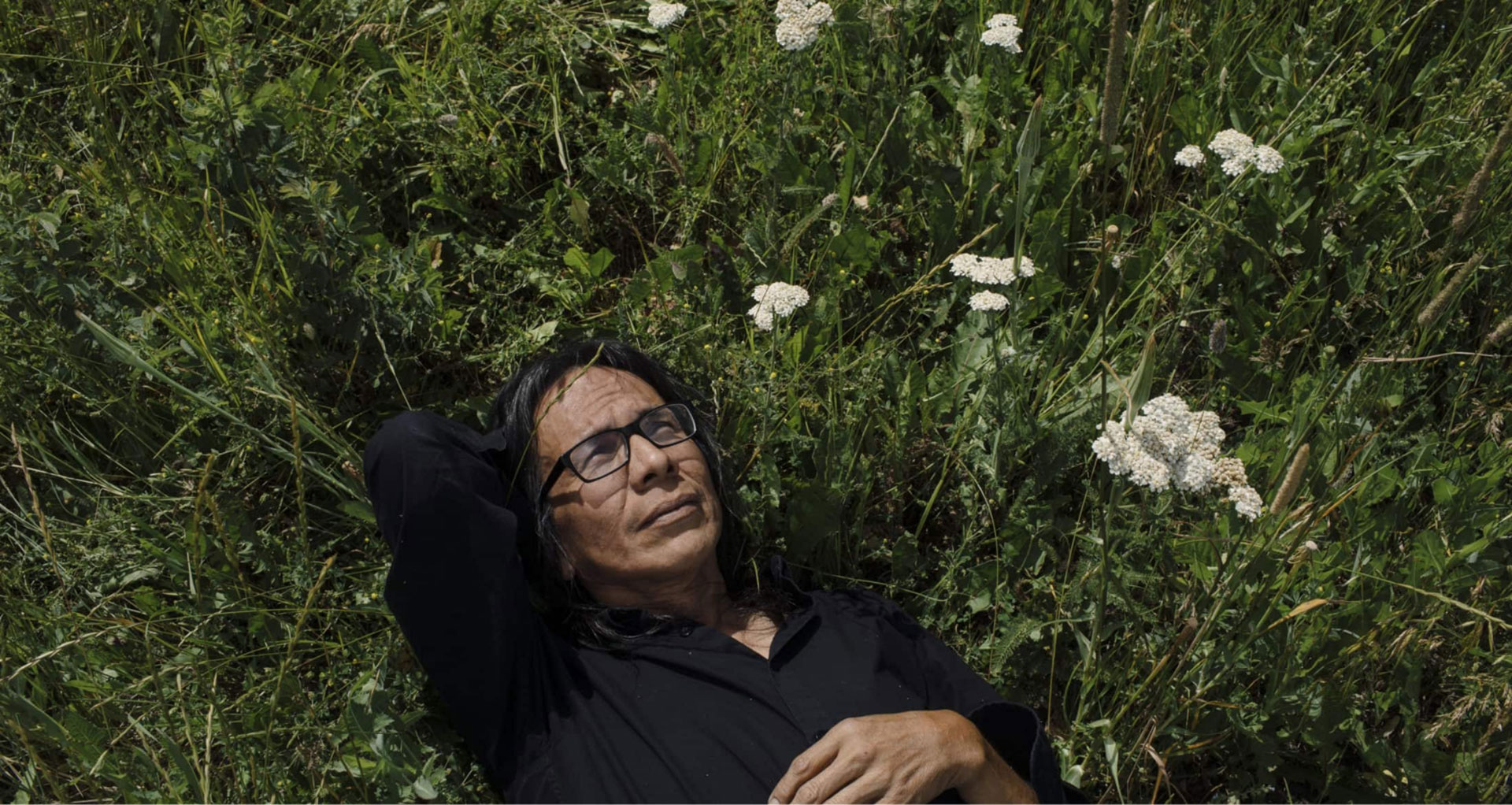
Environment
So, what matters now?
With the twin crises of biodiversity loss and climate change, time is not on our side. Now, more than ever, we must search out those sweet spots where collective action can benefit many and accelerate progress like never before. For us, that involves working at the intersection of climate, biodiversity, and sustainable livelihoods. Here, we have an opportunity to reimagine conservation in Canada to ensure it is grounded in respect for Indigenous Peoples, worldviews, rights, culture, and livelihoods.
Api’soomaahka, William Singer, featured in The Narwhal’s “Meet the people saving Canada’s native grasslands,” which won Best Digital Editorial Package at the Digital Publishing Awards. Photo: Amber Bracken
The Narwhal’s "Carbon Cache" Series
“Carbon Cache,” a special series produced by The Narwhal and funded by Metcalf, examined the role of Canada’s natural landscapes in the fight against climate change. Through in-depth research, reporting, and engaging coverage of this work, this award-winning series shed light on the issues, people, and communities working at the intersection of climate, biodiversity, and sustainable livelihoods, and helped Canadians understand the importance of nature-based climate solutions.
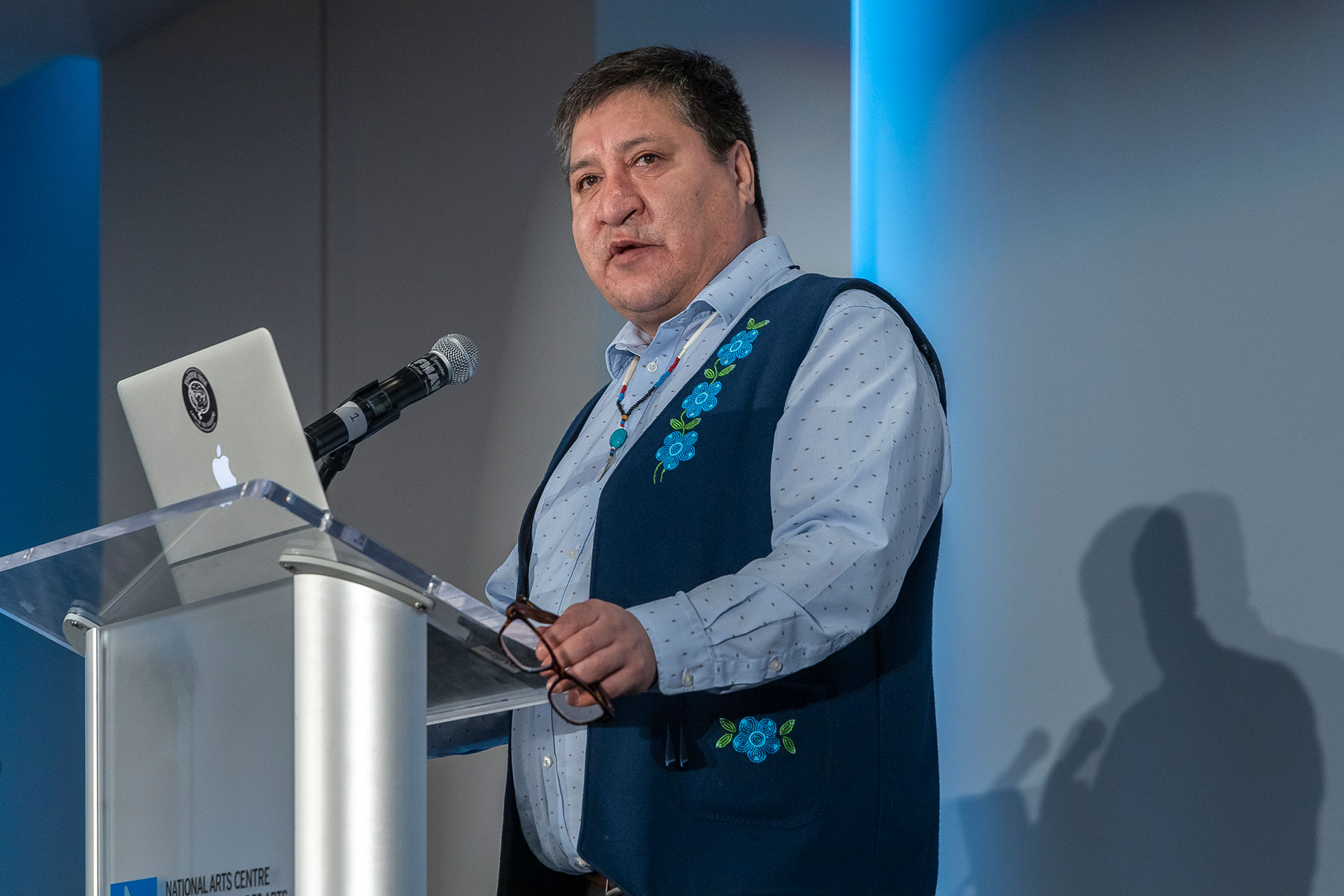
Nature-Based Climate Solutions Summit
In February 2020, we gathered in Ottawa with over 400 Indigenous leaders, cabinet ministers, industry and private sector leaders, NGO partners, and philanthropic colleagues from across the country for the Nature-Based Climate Solutions Summit. When we first launched Carbon Landscapes in 2017, one of our goals was to get nature-based climate solutions on the front burner of policy discussions and political decisions. At the gathering, the collective message was clear: now more than ever, we should tackle climate change and biodiversity loss with integrated nature-based climate solutions, and central to this effort must be support for Indigenous-led conservation.

An aerial view of globally-significant peatlands in northern Ontario, where the Mushkegowuk Council is advancing efforts to protect terrestrial and marine ecosystems in their homelands. Photo: Garth Lenz
New Landmark Research on Nature-Based Climate Solutions
The past two years marked the release of a range of important Metcalf-funded research. A groundbreaking report on the potential of natural climate solutions in Canada was published in Science Advances. Led by Nature United, the study was co-authored by 38 experts from 16 institutions. A project led by WWF-Canada in partnership with researchers at McMaster University released the most detailed map ever produced of Canada’s carbon stocks. This carbon mapping research was featured as an exclusive in The Globe and Mail. Scientists from WCS Canada, the University of Alberta, and other Canada-based universities and research organizations published a peer-reviewed article on the importance of northern peatlands. Researchers found that the vast and mostly intact peatlands in Canada – home to the largest peatland carbon stock on the planet – must be protected if the world is to achieve net-zero global CO2 emissions by 2050. Findings are highlighted in this accessible storymap.
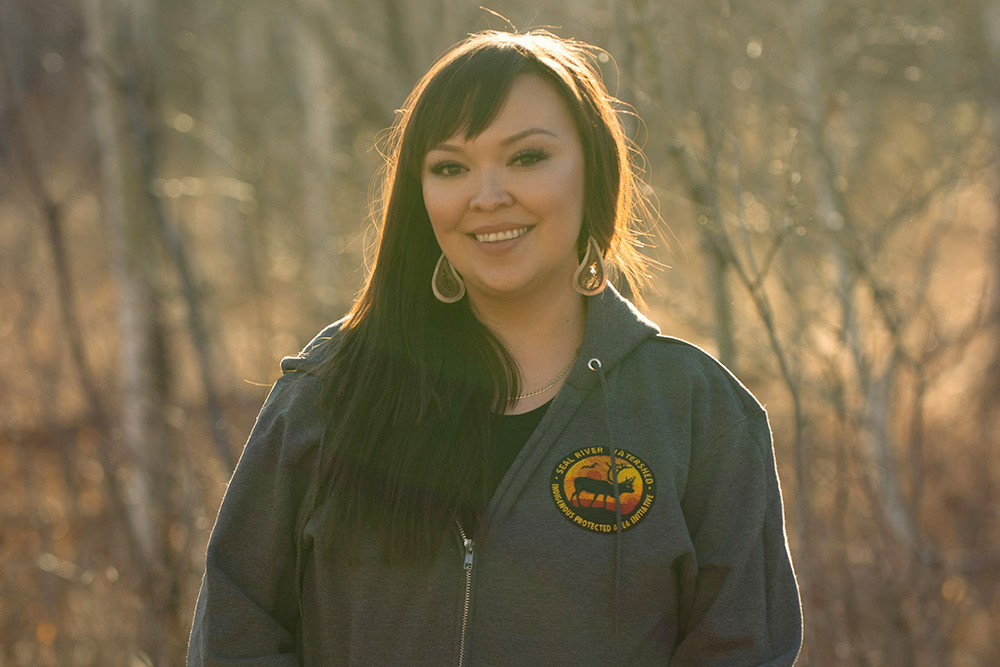
Growing Support for Indigenous Protected and Conserved Areas
We are heartened by the growing support across the country for Indigenous Protected and Conserved Areas (IPCAs). IPCAs are lands and waters where Indigenous governments have the primary role in protecting and conserving ecosystems through Indigenous laws, governance, and knowledge systems.* Through our Environment program, we have committed to prioritize funding for Indigenous-led conservation. From Cree Nation Government’s conservation and protected areas initiatives in Eeyou Istchee, to the Sayisi Dene First Nation’s leadership on the Seal River Watershed Initiative, to Mushkegowuk Council’s work to protect the Yehewin Aski and Kitaskiinan Kawekanawaynichikatek, there is so much good, inspiring work underway.
*As defined in The Indigenous Circle of Experts’ Report and Recommendations, 2018.
Share the Environment section:

Now?






Inclusive Local Economies
So, what matters now?
We must continue to centre the aspirations, efforts, and experiences of communities and workers, be bold in our long-term strategies, and nimble in our incremental approaches that create sustainable economic opportunities and generate wealth for low-income people and communities. Over the last two years we have seen communities rally together, institutions respond creatively, and public policies adapt with urgency — all in pursuit of the common good. We believe that decent work, neighbourhood resiliency, and equitable economic development are essential to mend the fissures in our society, and we will continue to work in collaboration with communities to pursue a more resilient, inclusive economy that offers wealth and well-being to all.
The persistent inequities experienced by low-wage workers and low-income people in Toronto have been troubling realities, long before the pandemic brought them into sharp relief. As we saw the pandemic deepen the fault lines in our society, we responded by working with renewed purpose and urgency — together with our partners and allies — to build back a vibrant city where prosperity can be shared and accessed by all.
Over the last decade, Metcalf has worked with incredible leaders and organizations in Toronto to raise the floor of low-wage work, improve access and opportunity to good jobs, and strengthen neighbourhood economies. When we checked in with our community of grantees early on in the pandemic, we saw how much was being asked of them, and how limited their resources were in the face of this crisis. While many were looking to these organizations for support, the staff and volunteers at these organizations were also experiencing significant upheaval and strain, and in need of more flexibility and resources.
In response, we reduced our reporting requirements, shifted some grants to unrestricted funding, and encouraged others to adapt their projects to what was most important to their organizations. We provided $610,000 in unrestricted emergency funding to the United Way of Greater Toronto and 25 current and past Metcalf grantees serving communities deeply impacted by the pandemic, as well as $225,000 in emergency funding to our neighbour, the Native Canadian Centre of Toronto, and the Toronto Aboriginal Support Services Council.
As the pandemic laid bare the harsh and unfair conditions experienced by low-wage and essential workers, we were heartened by the public support that converged on issues so many in our community had long been fighting for, including the need for paid sick days, increased protections for precarious workers, and equal access to income supports for all classifications of workers. As a result of the tireless efforts of several of our grantees, workers, community organizers, and advocates, we saw significant policy wins on increasing the minimum wage and strengthening supports for migrant workers.
The pandemic has underscored the importance of improving job quality for low-wage workers, upskilling, and better aligning the needs of job seekers and employers. As part of the Toronto Workforce Funder Collaborative — a newly established pooled fund of seven funders — we are responding to these workforce challenges by supporting strategies that bring more access, opportunity, and equity to our labour market.
The last two years have also been a strong reminder of the resilience and dynamism of neighbourhoods. The Parkdale neighbourhood continued to be an innovative leader and a source of inspiration, with the Parkdale People’s Economy pivoting quickly to support local mutual aid groups that formed throughout the pandemic and The Neighbourhood Land Trust (NLT) making significant additions to their affordable housing portfolio. The NLT model is gaining recognition as an effective way to mobilize community and capital in support of neighbourhood assets and priorities, and is already being replicated by other neighbourhoods.
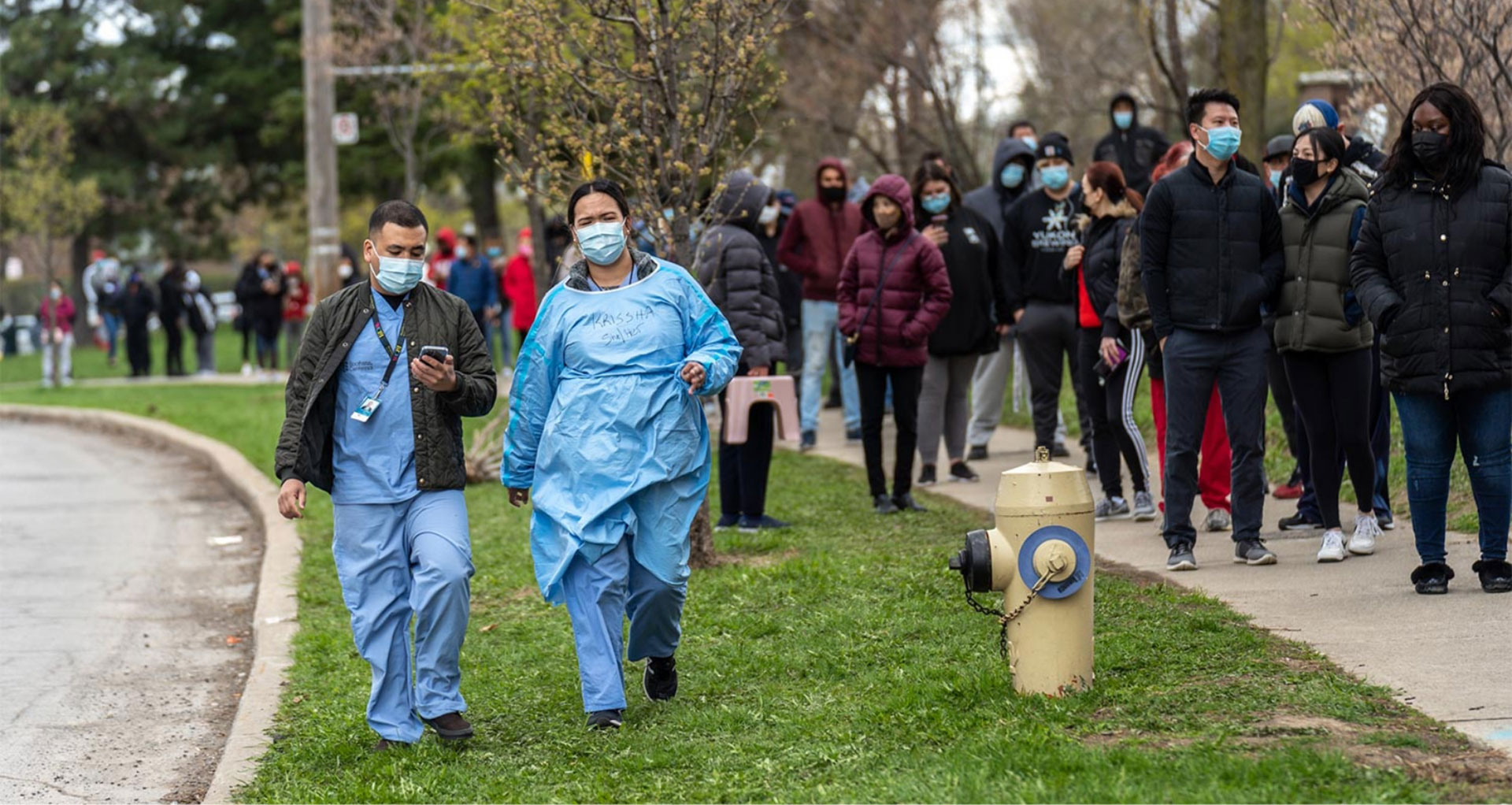
Inclusive Local Economies
So, what matters now?
We must continue to centre the aspirations, efforts, and experiences of communities and workers, be bold in our long-term strategies, and nimble in our incremental approaches that create sustainable economic opportunities and generate wealth for low-income people and communities. Over the last two years we have seen communities rally together, institutions respond creatively, and public policies adapt with urgency — all in pursuit of the common good. We believe that decent work, neighbourhood resiliency, and equitable economic development are essential to mend the fissures in our society, and we will continue to work in collaboration with communities to pursue a more resilient, inclusive economy that offers wealth and well-being to all.
Lineup outside a pop-up vaccine clinic on Tobermory Drive in the Jane and Finch area. Photo: Yader Guzman/The Local
The Local’s Pandemic Coverage
The Local is an independent magazine exploring urban health and social issues in Toronto. Throughout the pandemic, The Local provided comprehensive coverage with a human-centred approach to storytelling and data-driven analysis, and shared perspectives from often overlooked neighbourhoods in Toronto, while winning several awards for this work. Standout pieces over this period included “The 35 Jane,” on what a bus route reveals about race, class, and social vulnerability during a pandemic; “A Long-Term Tragedy,” on the devastation in seniors homes during COVID-19 and the troubling history of our long-term care system; and “Vaccinating Toronto,” a special series that covered the largest vaccination campaign in history.
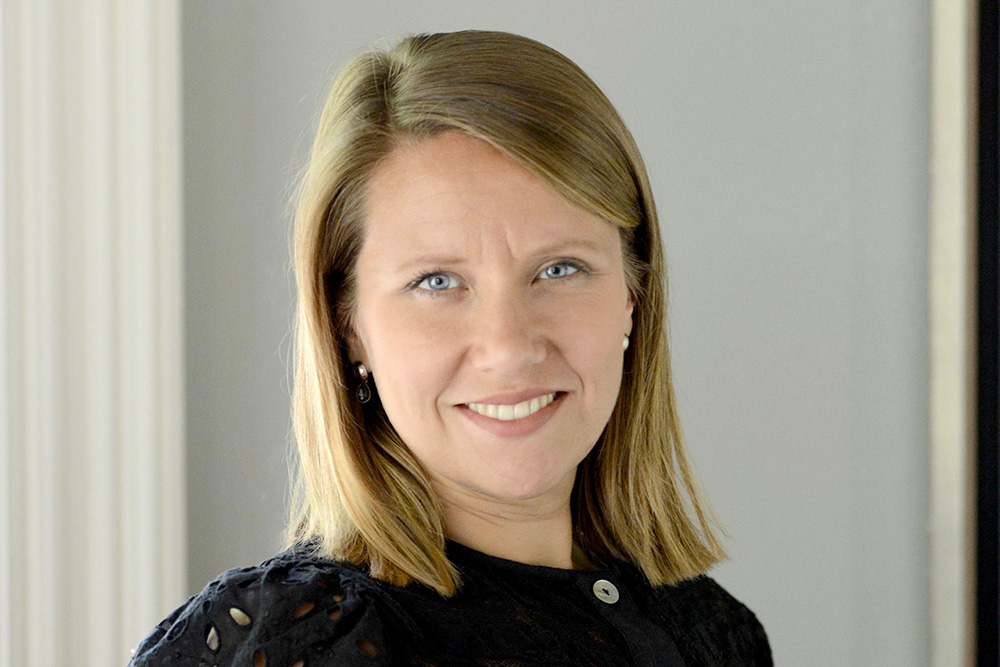
Danielle Olsen. Photo: Guntar Kravis
When Training Works by Danielle Olsen and John MacLaughlin
Danielle Olsen’s Innovation Fellowship focused on the policies and practices that improve the economic opportunities of low-income people while supporting the needs of employers. Her report When Training Works: Promising workforce development practices, co-authored with John MacLaughlin, highlighted the work of four innovative organizations — NPower Canada, Building Up, Elevate Plus Manufacturing, and ACCES Employment — each leading the way in demonstrating how workforce solutions can be poverty reduction strategies and connect job seekers to good jobs.
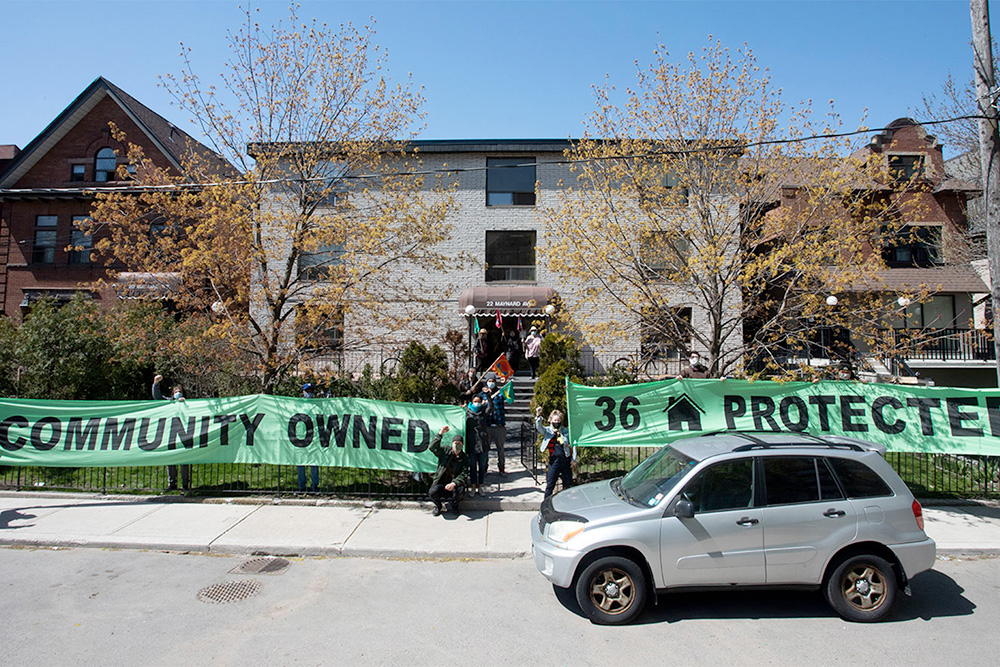
Residents and community members celebrating The Neighbourhood Land Trust’s acquisition of 22 Maynard Avenue, a 36-unit affordable rental property in Parkdale, Toronto. Photo: The Neighbourhood Land Trust
The Neighbourhood Land Trust’s Leading and Innovative Model
The scarcity of affordable housing is a growing crisis in Toronto. For nonprofits looking to buy and preserve the affordable housing stock, mortgage-lending policies and bidding wars have typically kept properties out of reach. Looking for a solution, The Neighbourhood Land Trust (NLT), the charitable arm of the Parkdale Neighbourhood Land Trust, created a first-of-its-kind impact investment offering — in partnership with Vancity Community Investment Bank — to mobilize the capital needed to move quickly to purchase buildings when they go up for sale. NLT’s leadership, vision, and model has enabled it to grow its assets significantly in the last few years — recently taking possession of 81 single-family homes and small buildings from Toronto Community Housing Corporation and informing municipal policy to create permanent affordable housing.
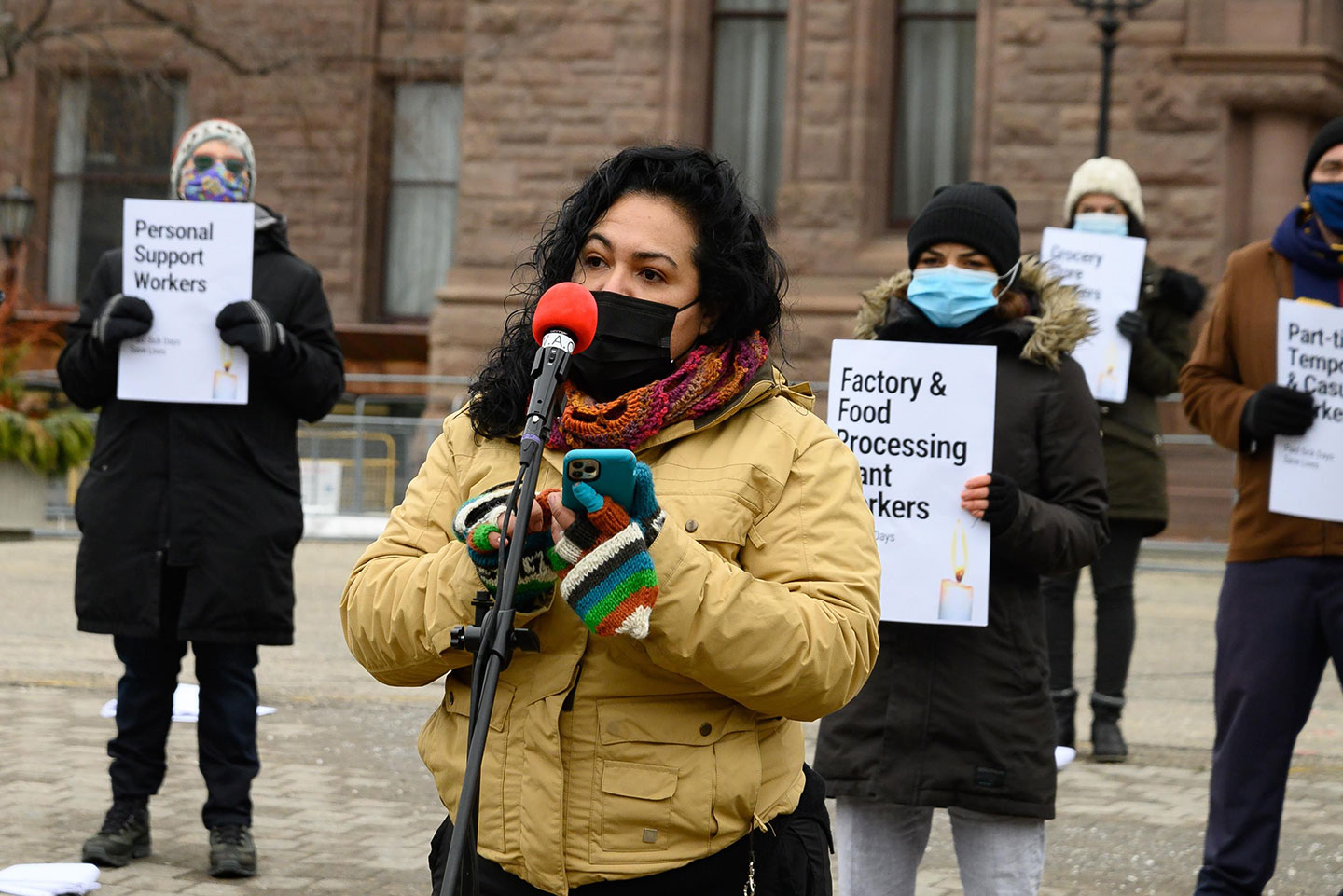
Veronica Zaragoza, an organizer with the Workers’ Action Centre, speaking on the need for permanent paid sick days outside Queen’s Park. Photo: Jared Ong
Significant Policy Wins for Workers
Over the course of the pandemic, the Migrant Workers Alliance for Change (MWAC) and the Workers’ Action Centre (WAC) were pivotal resources, advocates, and support for low-wage racialized and migrant workers. MWAC provided legal rights education to over 3,000 student workers in the Greater Toronto Area. Their advocacy resulted in the federal government creating a path to permanent residency status for 40,000 student workers, as well as pathways for migrants in low-wage occupations for the first time. WAC continued its organizing and advocacy efforts to raise the minimum wage and create paid sick days for all workers in Ontario. In 2021, the provincial government installed three temporary paid sick days, and finally delivered a $15 per hour minimum wage after cancelling previous increases.
Share the Inclusive Local Economies section:

Now?






Performing Arts
So, what matters now?
The arts and culture sector is at a crossroads. While some in the sector are struggling to resist the strong gravitational pull back to practices and behaviours that they recognize and find comfort in, a growing number of practitioners, stakeholders, and thought leaders are embracing the opportunity to imagine a new future. The last two years have been incredibly challenging, and how we collectively respond to the timely and relevant questions that have surfaced will determine if the sector comes through better and stronger. For our part, we will continue to support approaches that strengthen equity, question relevancy, seek capacity growth, and explore new models that better serve all who make and consume artistic experiences.
Arts and culture, especially the performing arts, depend to a large extent on people coming together in shared spaces in real time. Early concern that the performing arts sector was going to be one of the hardest hit by the pandemic, unfortunately came to pass — not only was it among the first sectors to close, it became one of the last to reopen.
As we witnessed the sudden overnight closures of rehearsal halls and performance venues across Toronto, Metcalf moved to provide unrestricted emergency support, with a specific focus on equity-deserving organizations that had been disproportionately affected by the pandemic. We started by providing emergency funding to organizations that Metcalf had developed deep relationships with over the last 10 years, and followed by assembling an advisory committee of Black, Indigenous, and other arts leaders of colour who crafted eligibility criteria, nominated candidates, and made the final grant recommendations to equity-deserving organizations. We ultimately awarded a total of $697,500 to 47 organizations in Toronto on an unrestricted basis with no reporting requirements.
In tandem with the need for emergency funding, the demand for the internship experience rose to new heights over the last two years. New leaders were not only seeking the hard skills needed to become more effective curators, administrators, or artistic directors through challenging times, but also the aptitudes needed to reimagine their art forms within a rapidly changing environment.
While working on constantly shifting ground, performing arts organizations nonetheless recognized the value of slowing down in the face of overwhelming obstacles. Organizations saw the benefit of investing in a guided process of experimentation with new tools to address significant challenges through our Staging Change initiative. As these grantees continued to face a broad set of concerns in traditional areas such as increasing audience reach, building new revenue streams, and deepening artistic experiences, a new set of foundational preoccupations surfaced over the last two years. These included questions around the very relevance of legacy art forms such as classical ballet, opera, and the symphony; the burgeoning role of digital platforms; the need for more adaptive and sustainable business models;and an urgent call for the sector to address its relationship to systemic inequities.
Recognizing the time was ripe for the sector as a whole to address both longstanding and emerging issues as it explored new ways to build a more resilient future, Metcalf funded several projects in 2021 that had sector-wide implications: research on the state of rehearsal spaces for artists; insightful analysis of arts-specific data around issues of precarity, women in the arts, and climate among others; collaborative efforts to address policy gaps within arts and culture; and the intersection between community arts practice and the ambitions of environmental organizations.
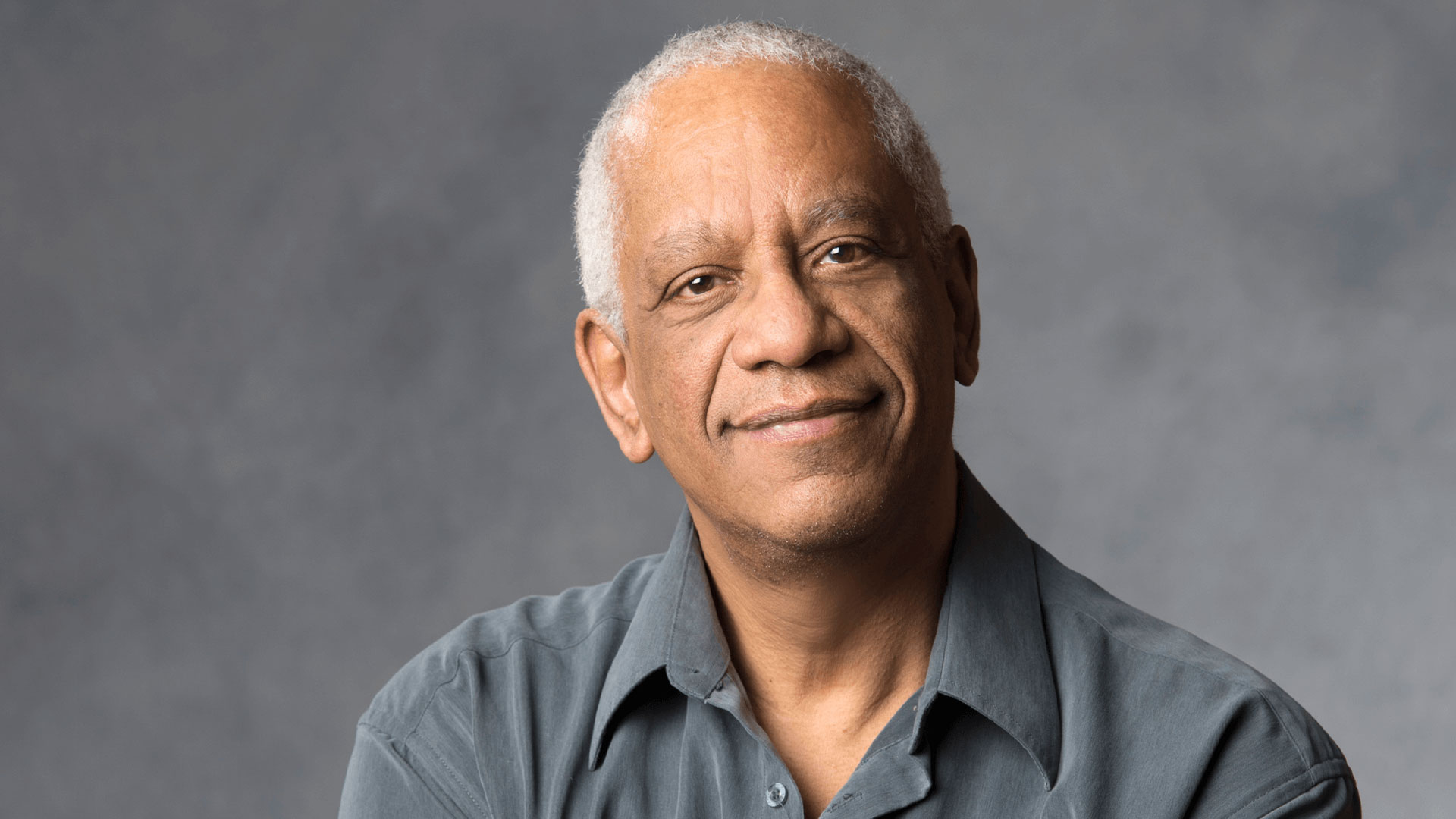
Performing Arts
So, what matters now?
The arts and culture sector is at a crossroads. While some in the sector are struggling to resist the strong gravitational pull back to practices and behaviours that they recognize and find comfort in, a growing number of practitioners, stakeholders, and thought leaders are embracing the opportunity to imagine a new future. The last two years have been incredibly challenging, and how we collectively respond to the timely and relevant questions that have surfaced will determine if the sector comes through better and stronger. For our part, we will continue to support approaches that strengthen equity, question relevancy, seek capacity growth, and explore new models that better serve all who make and consume artistic experiences.
Philip Akin. Photo: David Cooper
Philip Akin Black Shoulders Award
Actor, director, community leader, retired Founding Artistic Director of Obsidian Theatre, and long-time Metcalf collaborator Philip Akin was honoured by the theatre community with the launch of the Philip Akin Black Shoulders Award, which supports and nurtures emerging Black Canadian theatre artists through financial support, artistic guidance, and national promotion. Metcalf was pleased to make a $75,000 contribution to the legacy fund to enable five yearly awards of $5,000 to be made available in perpetuity.

Arts Insight Canada
Gathering, analyzing, and implementing data to improve organizational health and support policy interventions are complex endeavours, requiring skills that few within the arts sector have access to. In collaboration with the Azrieli Foundation and Rozsa Foundation, Metcalf partnered with Hill Strategies Research over a year-long process to seek out relevant data on timely issues including reconciliation, climate change, precarity, and post-pandemic transformations.
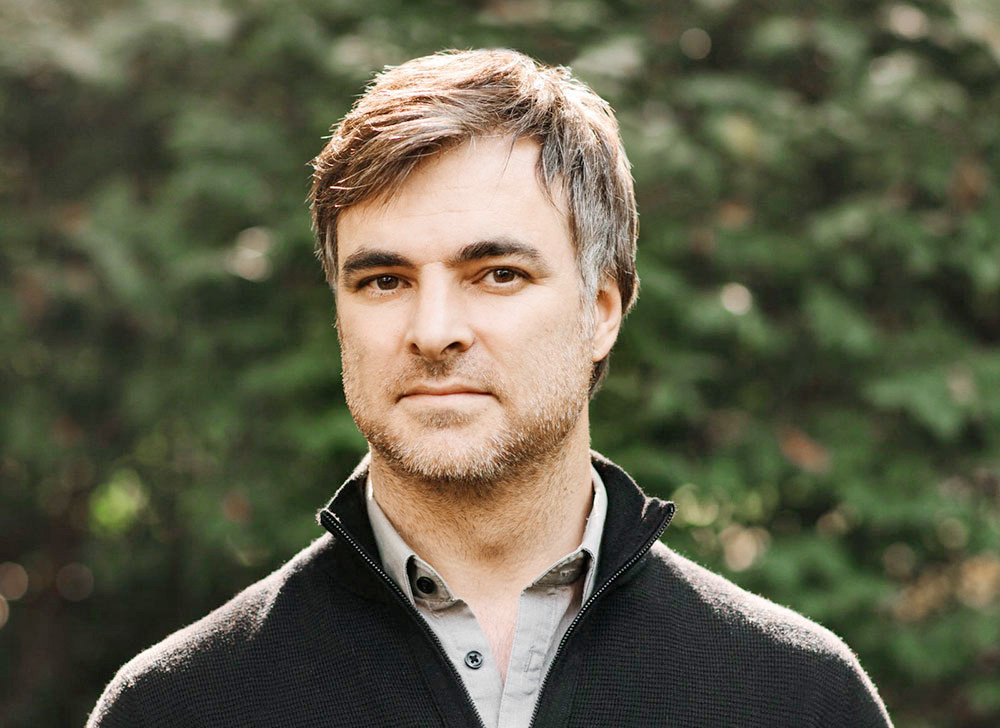
Art and the World After This by David Maggs
Originally set up to delve anew into the question of the value of the arts, David Maggs’s Innovation Fellowship pivoted as a result of the pandemic to ask two profound questions: what does a cultural sector do? And what should we do with a cultural sector? The resulting paper, Art and the World After This, struck a resounding chord with the arts community in Canada and beyond. Recognizing the desire in the arts sector to move with and shape ongoing patterns of transformative societal change, David was invited to extend his work over two more years as Metcalf’s inaugural Fellow on Arts and Society.
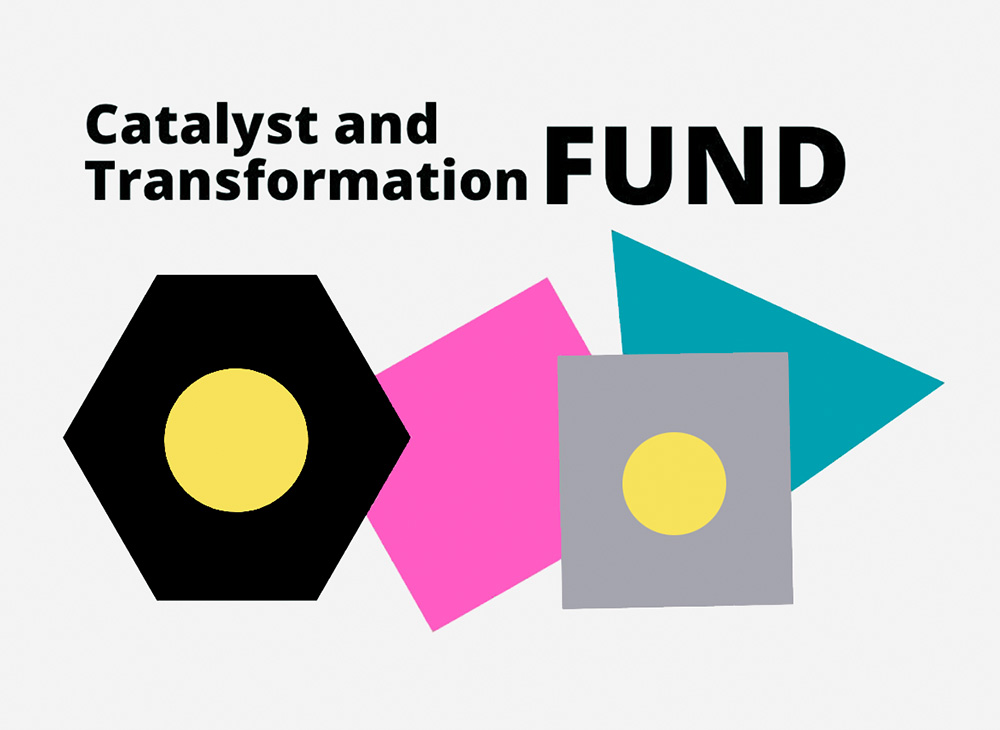
Catalyst and Transformation Fund
The pandemic has had an outsized impact on the arts and culture sector in Toronto, bringing about significant challenges and upheaval for the organizations that work in this space. To help organizations considering a significant shift in their business model through mergers, wind-downs, or other substantial changes, Metcalf partnered with the City of Toronto, the Canada Council for the Arts, and WorkInCulture to create the Catalyst and Transformation (CAT) Fund to provide access to legal and accounting assistance to support these transformational life cycle decisions.
Johannas
The Johanna Metcalf Performing Arts Prizes/Les Prix Johanna-Metcalf des Arts de la scène (Johannas) celebrate artists in Ontario who have made a recognized impact on the field and the public, and show great promise in the ongoing pursuit of their ambitious and visionary practices. Established in 2019 and named in honour of Johanna Metcalf — who was at the heart of the Metcalf Foundation’s work for over 40 years — the biennial prizes amplify her legacy as a passionate supporter of the arts and artists, and is delivered in partnership with the Ontario Arts Council.
2021 Johannas
Each winner received $25,000 and named a protégé as a way of celebrating early career artists who are showing formidable promise. Protégés were awarded $10,000 each, a $5,000 increase from the inaugural prize year in appreciation of the particular challenges faced by artists growing into their careers over these last two years. The total value of the prizes was $175,000.
Learn more about the Johannas.

Johannas
The Johanna Metcalf Performing Arts Prizes/Les Prix Johanna-Metcalf des Arts de la scène (Johannas) celebrate artists in Ontario who have made a recognized impact on the field and the public, and show great promise in the ongoing pursuit of their ambitious and visionary practices. Established in 2019 and named in honour of Johanna Metcalf — who was at the heart of the Metcalf Foundation’s work for over 40 years — the biennial prizes amplify her legacy as a passionate supporter of the arts and artists, and is delivered in partnership with the Ontario Arts Council.
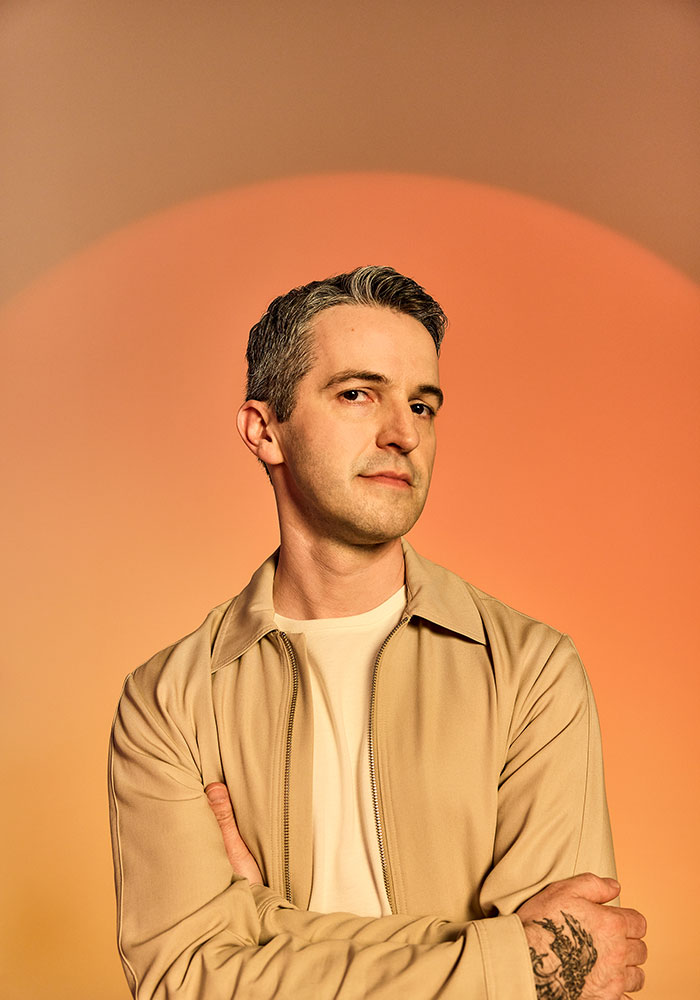
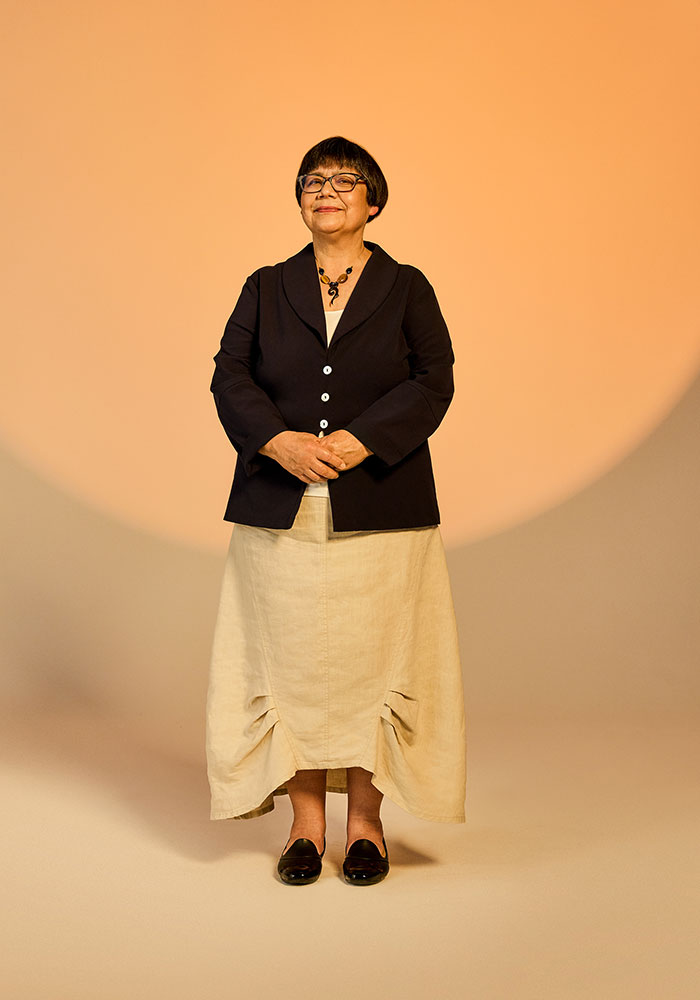
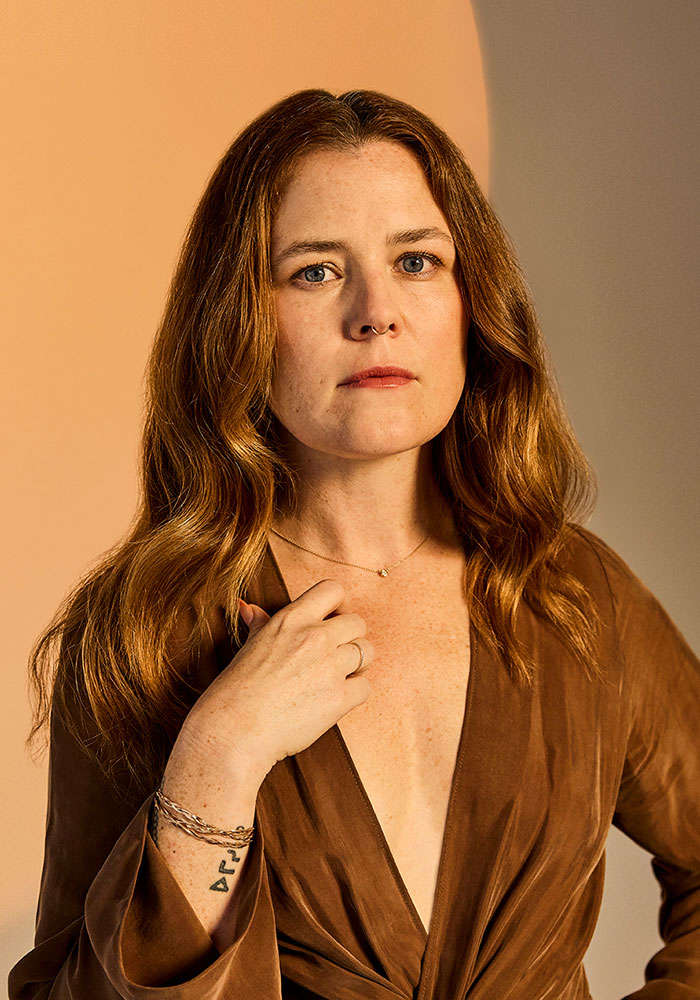



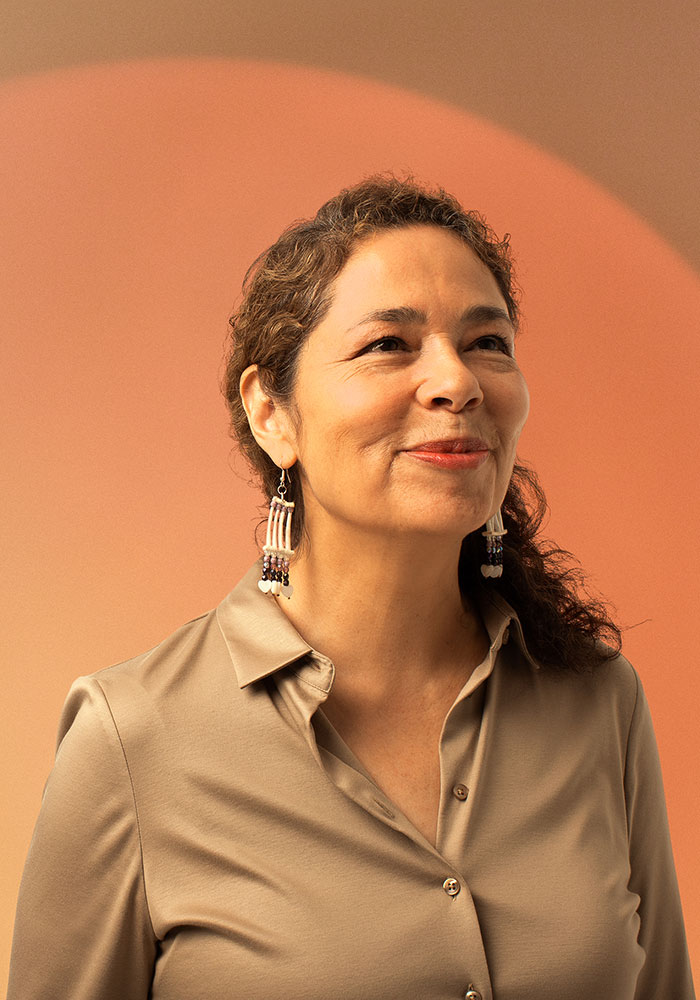

Aria Evans, protégé of Sandra Laronde, is an award-winning, queer, Toronto-based interdisciplinary artist working in dance, theatre, and film. Aria is the 2021 Metcalf Artistic Director Intern at Soulpepper.
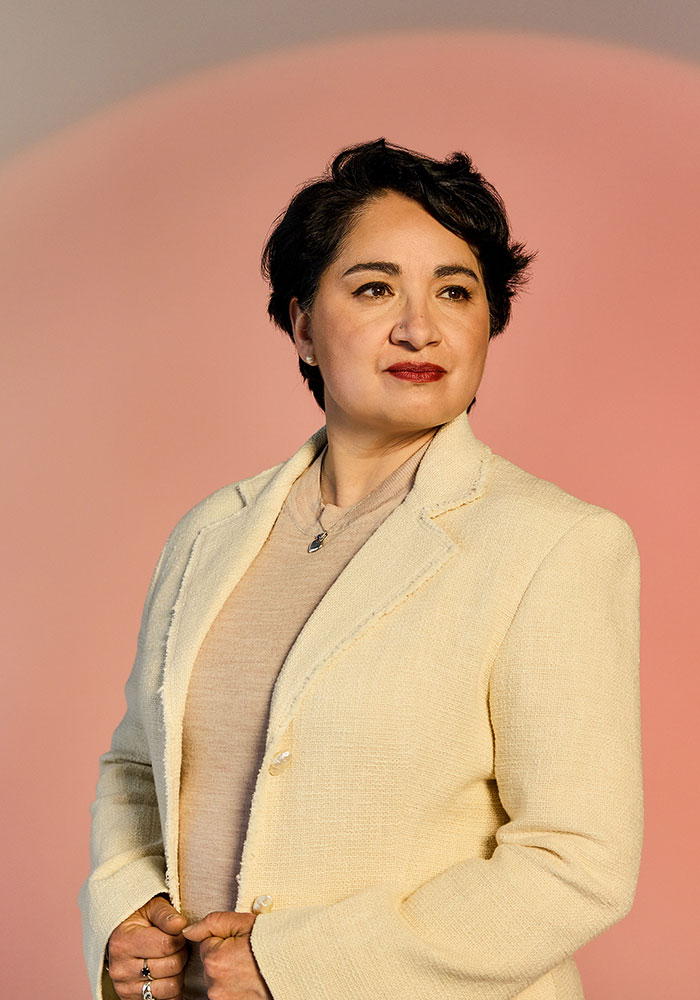

Share the Performing Arts section:

Now?





The Nonprofit Sector.
One of the highlights of our granting over this unprecedented pandemic period was providing funding to organizations that support the nonprofit sector as a whole. At a time when so much was being demanded of nonprofit organizations — to continue delivering programs and services while enduring significant pandemic-related revenue losses and volunteer shortages — it was important to support these sector-wide organizations bolstering the nonprofit community.
The Nonprofit Sector in Canada
Nonprofit
Organizations
Contribution to GDP
Imagine Canada & HR Intervals
Imagine Canada is a national charitable organization that supports and strengthens Canadian charities and nonprofits. The nonprofit sector relies on the talent of more than 2.5 million individuals to craft and deliver essential and innovative services to help our communities thrive. Yet most organizations don’t have an HR department or access to the information and resources they need to perform HR functions as effectively as they would like.
Imagine Canada created HR Intervals — a free HR toolkit — to address this gap by providing a comprehensive, bilingual online knowledge base to help nonprofit managers, employees, and board members better understand, address, and guide people management within their organizations.
Carleton University & Charity Insights Canada Project
Carleton University is launching a major research project that will change our knowledge about the charitable sector in Canada.
Despite employing over 10% of Canada’s full-time workforce and contributing $189 billion to the national GDP, timely data on the charitable sector is scarce. The Charity Insights Canada Project—Projet Canada Perspectives des Organismes de Bienfaisance (CICP-PCPOB) will collect and share accurate, relevant, and timely information about the Canadian charitable sector. The data generated through this work will support the long-term economic viability, impact, and resiliency of the sector by assisting policymakers in making evidence-based policy decisions, developing data capacity for practitioners, and expanding knowledge of Canada’s charitable sector for all stakeholders, including the general public.
Ontario Nonprofit Network & COVID-19 Sector Support
The Ontario Nonprofit Network (ONN) is an independent network for the 58,000 nonprofits in Ontario, focused on policy, advocacy, and services to strengthen Ontario’s nonprofit sector. From daycares to long-term care homes, shelters to food banks, Ontario’s nonprofits and charities have been on the frontlines supporting and serving communities throughout the pandemic.
To help nonprofit organizations navigate and manage the challenges around human resources, finances, and service delivery, ONN provided regular updates to share relevant information, advocated for increased sector support from the government and other funders, and created a suite of COVID-19 tools and resources.
Grants
Between 2020 and 2021, the Metcalf Foundation invested over $16 million in charitable activities. In addition to supporting our three program areas — Environment, Inclusive Local Economies, and Performing Arts — we dedicated $3 million in funding specifically for our COVID-19 response while continuing to reserve a portion of funding for grants outside of our formal program areas.
COVID-19 Grants
Grant Spotlight:
Community Foundations of Canada
$250,000 to support the Indigenous Peoples Resilience Fund.
The Indigenous Peoples Resilience Fund (IPRF) is a new fund created and guided by Indigenous Peoples to support Indigenous communities and organizations through the COVID-19 public health crisis. The IPRF is supported by a network of philanthropic and corporate funders. In July 2020, IPRF approved their first round of support to communities across Canada. By December 2021, IPRF had provided over $7 million in support to 316 Indigenous communities and organizations through 20 different intakes.
Environment Grants
Inclusive Local Economies Grants
Thank You, John Stapleton — Celebrating Over a Decade of Innovation and Impact
The Metcalf Innovation Fellowship program was created to provide critical thinkers with the opportunity to tackle hard questions and propose solutions to systemic issues. John Stapleton, our longest serving Innovation Fellow, has been the embodiment of this purpose — publishing 11 reports with Metcalf while shaping policies to improve income security for the most vulnerable and marginalized in Canada.
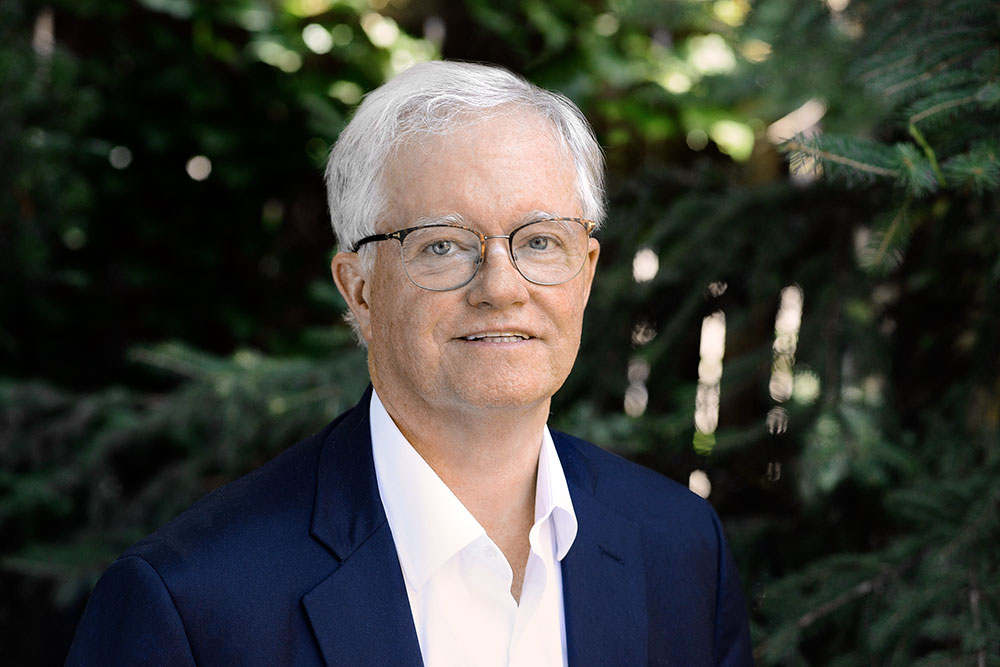
—John Stapleton
Metcalf Innovation Fellow, 2006-2020
—Sandy Houston
President and CEO, Metcalf Foundation
Performing Arts Grants
General Fund Grants
Documenting the Important History of the Ongoing Regent Park Revitalization
Regent Park’s heralded revitalization is heading into the homestretch. As one of Canada’s largest public housing complexes, the neighbourhood has been transformed over the last 15 years into a mix of social housing units, market condominiums and townhouses, retail shops, and community facilities.
Led by the University of Toronto and Spacing, and funded by Metcalf through our General Fund, Regent Park: A Progress Report (2021) examines several aspects of the project to date, including built form, social development, community benefits, and the broader housing policy environment. Previously, we funded Regent Park: A Story of Collective Impact (2013), which highlighted the community members and partners that drove the Regent Park transformation.
As the Regent Park revitalization continues to be a project of local, national, and international interest, our hope is that Regent Park: A Progress Report will become a meaningful document in the project’s history, providing helpful learnings for carrying out the remainder of this project and other similar urban redevelopment endeavours.
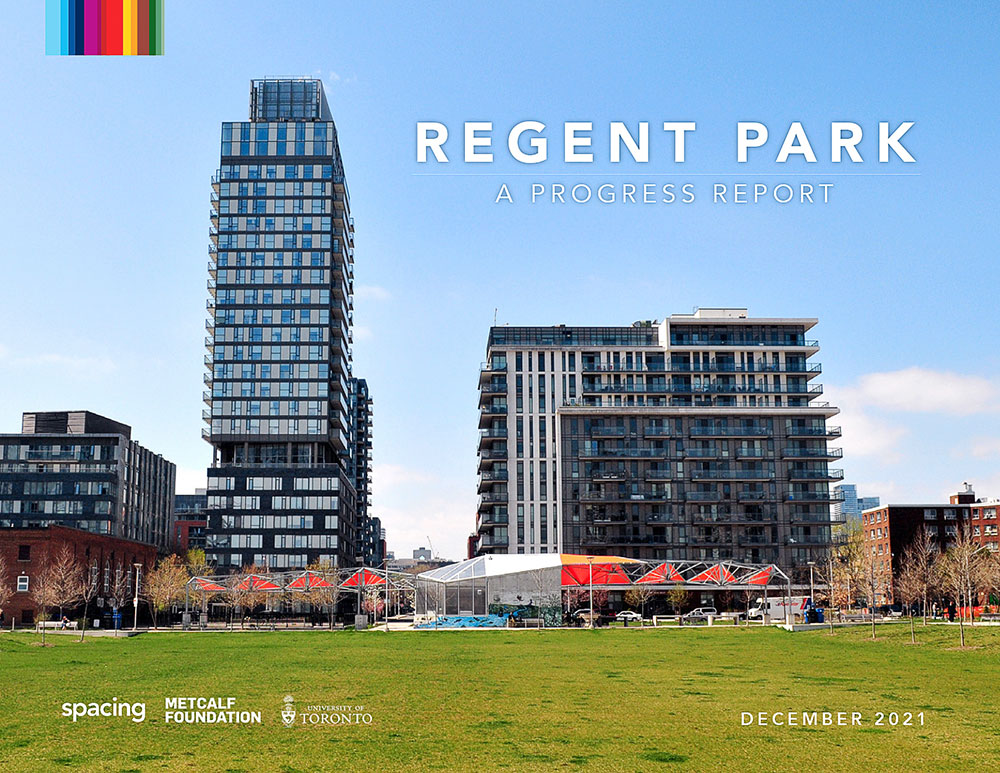
Grant Spotlight:
Canadian Institute for Advanced Research (CIFAR)
$900,000 over 6 years to support the Bio-inspired Solar Energy Program, which is creating new renewable energy technology.
Humans consume one trillion watts of energy annually, and the amount will double by 2050. The fossil fuels that we use to generate most of that energy drives global warming, making it vital that we develop renewable energy. CIFAR’s Bio-inspired Solar Energy program brings together researchers from across disciplines to work on questions that can lead to more efficient solar panels, better batteries, new green fuels, and other technologies that will feed the world’s need for energy without contributing to climate change.
Grant Spotlight:
Community Food Centres Canada
$500,000 over 3 years to support The Poverty Action Unit.
The Poverty Action Unit, a new Community Food Centres Canada initiative, builds on their commitment to grassroots community advocacy and success in the national policy arena. Metcalf is the founding partner of The Poverty Action Unit, which aims to ensure Canada has income policies that respect the dignity of every person living in the country. The Poverty Action Unit plans to build strong relationships with federal policymakers, especially those focused on income security; advance smart policy proposals that reflect and support the lived experiences of community members; and align national public policy activities and local civic advocacy for increased impact.
Board Member-Initiated Grants

Now?




Impact Investing
Impact investments are investments made into companies, organizations, and funds with the intention to generate positive social or environmental impact alongside a financial return — it’s a way to do well by doing good.
Impact investing provides us with another way to make a difference with our money beyond our grantmaking. We believe we can accelerate our ability to achieve our mission by investing our financial assets directly in support of our goals.
Harnessing the power of our endowment to build affordable housing and community real estate, support microlending for job training and licensing, and develop clean energy and sustainable food companies, are examples of how we are putting capital to work for purpose beyond profits.
As of December 31, 2021, we have committed $9,300,000 in capital from our endowment towards impact investments.
Impact Investments Committed
CURRENT INVESTMENTS
Amplify Capital
$750,000
Amplify Capital invests in technology companies that have the potential to scale to solve social and environmental challenges.
ArcTern Ventures
$1,500,000
ArcTern Ventures invests in technology companies that have a positive impact on climate change and sustainability.
Centre for Social Innovation: CSI Spadina Community Bond
$150,000
The CSI Spadina Community Bond enabled the Centre for Social Innovation to finance the acquisition and rehabilitation of a brick and beam building at 192 Spadina Avenue to expand its coworking real estate.
Community Forward Fund
$500,000
The Community Forward Fund provides loans to Canadian nonprofit organizations, charities, and nonprofit social enterprises across a wide variety of sectors including housing, the arts, renewable energy, food, and community spaces.
Deetken Impact: Ilu Women’s Empowerment Fund
$250,000
The Ilu Women’s Empowerment Fund invests in businesses that empower women and advance gender equality in Latin America and the Caribbean.
InvestEco
$1,000,000
InvestEco invests in expansion-stage companies in North America that promote health and sustainability in the food and agricultural sector.
Mackenzie Investments: Mackenzie Greenchip Global Environmental All Cap Fund
$450,000
The Mackenzie Greenchip Global Environmental All Cap Fund invests in companies in the following sectors: clean energy, energy efficiency, clean technology, water treatment and supply, sustainable agriculture, and sustainable transportation.
New Commons Development
$750,000
New Commons Development develops affordable housing and social purpose real estate to be stewarded by community-based organizations and maintained as affordable in perpetuity.
New Market Funds: NMF Rental Housing Fund
$1,250,000
The NMF Rental Housing Fund partners with nonprofit and co-operative operators to invest in new-build or substantially renovated multi-family affordable rental housing.
The Neighbourhood Land Trust
$500,000
The Neighbourhood Land Trust — the charitable arm of the Parkdale Neighbourhood Land Trust — owns and manages land in a community ownership model, collaborating with social housing partners to provide high quality affordable housing, supportive housing, and community economic development programs.
Raven Indigenous Capital Partners
$500,000
Raven Indigenous Capital Partners invests in early and growth stage Indigenous companies that support the ongoing revitalization of the Indigenous economy in Canada and the United States.
Renewal Funds
$1,500,000
Renewal Funds invests in early growth stage companies focused on environmental innovation and sustainable consumer products.
Windmill Microlending
$200,000
Windmill Microlending offers microloans to help skilled immigrants and refugees continue their careers in Canada.
Palmetto
Palmetto, an ArcTern investment, is transforming residential solar sales with its marketplace platform model. The Palmetto platform brings together all groups involved in residential solar – gig workers who want to sell solar in their local areas, installers of high-quality residential solar systems, global equipment providers, financiers, and post-installation service providers – and provides end-to-end workflow software for platform members to seamlessly execute solar installs. As of September 2021, Palmetto homeowners are on track to prevent more than one million metric tons of carbon dioxide from reaching our atmosphere.
Satya Organic
Satya Organic, a Raven Capital investment, was founded by Patrice Mousseau, an Ojibway entrepreneur. Inspired to find a non-steroid, natural solution to her young daughter’s eczema, Patrice combined her knowledge of medical research and traditional Indigenous medicine to create a balm made from a combination of simple and organic whole ingredients to soothe skin and reduce inflammation. Currently based in North Vancouver, Patrice operates Satya from her home on Tsleil-Waututh First Nation. The balm first created in her home kitchen crockpot is now available in over 900 stores across Canada.
Windmill Microlending
Windmill supports immigrants and refugees who come to Canada with education, skills, and experience but struggle to resume their careers here. Windmill provides microloans of up to $15,000 to clients who may not otherwise qualify for credit products offered by larger financial institutions, which can be used towards exams, training, books and materials, relocation costs, professional association fees, and other expenses related to advancing their career. On average, clients triple their income by the time their loan is repaid. Windmill has provided over $35 million in loans and supported over 5,000 skilled immigrants and refugees.
Share the Impact Investing section:
Financial Information
| CONDENSED STATEMENT OF FINANCIAL POSITION AS AT DECEMBER 31, 2021 | ||
|---|---|---|
| 2021 | 2020 | |
| ASSETS | ||
| Cash and cash equivalents | 3,826,080 | 2,338,726 |
| Accrued interest and dividends receivable | 747,607 | 192,537 |
| Investments at market value | 196,864,957 | 176,232,189 |
| Other receivables and capital assets | 2,140,382 | 2,178,739 |
| 203,579,026 | 180,942,191 | |
| LIABILITIES | ||
| Accounts payable and accrued liabilities | 3,677,888 | 2,406,849 |
| NET ASSETS | 199,901,138 | 178,535,342 |
| CONDENSED STATEMENT OF REVENUE AND EXPENDITURES | ||
| REVENUE | 30,783,432 | 16,032,255 |
| EXPENDITURES | ||
| Investment-related | 420,405 | 342,605 |
| Other | 574,222 | 604,178 |
| 994,627 | 946,783 | |
| REVENUE BEFORE GRANTS | 29,788,805 | 15,085,472 |
| GRANTS AND DIRECT CHARITABLE ACTIVITIES | ||
| Performing Arts | 1,001,527 | 935,191 |
| Environment | 2,233,201 | 1,495,076 |
| Inclusive Local Economies | 2,174,268 | 1,358,475 |
| Special Initiatives | 1,579,498 | 2,637,000 |
| Direct charitable activities | 1,434,515 | 1,407,317 |
| 8,423,009 | 7,833,059 | |
| EXCESS OF REVENUE OVER EXPENDITURES | 21,365,796 | 7,252,413 |
| CONDENSED STATEMENT OF FINANCIAL POSITION AS AT DECEMBER 31, 2021 | ||
|---|---|---|
| 2021 | 2020 | |
| ASSETS | ||
| Cash and cash equivalents | 3,826,080 | 2,338,726 |
| Accrued interest and dividends receivable | 747,607 | 192,537 |
| Investments at market value | 196,864,957 | 176,232,189 |
| Other receivables and capital assets | 2,140,382 | 2,178,739 |
| 203,579,026 | 180,942,191 | |
| LIABILITIES | ||
| Accounts payable and accrued liabilities | 3,677,888 | 2,406,849 |
| NET ASSETS | 199,901,138 | 178,535,342 |
| CONDENSED STATEMENT OF REVENUE AND EXPENDITURES | ||
| REVENUE | 30,783,432 | 16,032,255 |
| EXPENDITURES | ||
| Investment-related | 420,405 | 342,605 |
| Other | 574,222 | 604,178 |
| 994,627 | 946,783 | |
| REVENUE BEFORE GRANTS | 29,788,805 | 15,085,472 |
| GRANTS AND DIRECT CHARITABLE ACTIVITIES | ||
| Performing Arts | 1,001,527 | 935,191 |
| Environment | 2,233,201 | 1,495,076 |
| Inclusive Local Economies | 2,174,268 | 1,358,475 |
| Special Initiatives | 1,579,498 | 2,637,000 |
| Direct charitable activities | 1,434,515 | 1,407,317 |
| 8,423,009 | 7,833,059 | |
| EXCESS OF REVENUE OVER EXPENDITURES | 21,365,796 | 7,252,413 |



Matters
Now

Thank you to our board, advisors, and staff for their thoughtful and creative contributions to our work.
38 Madison Avenue
Toronto, ON
M5R 2S1